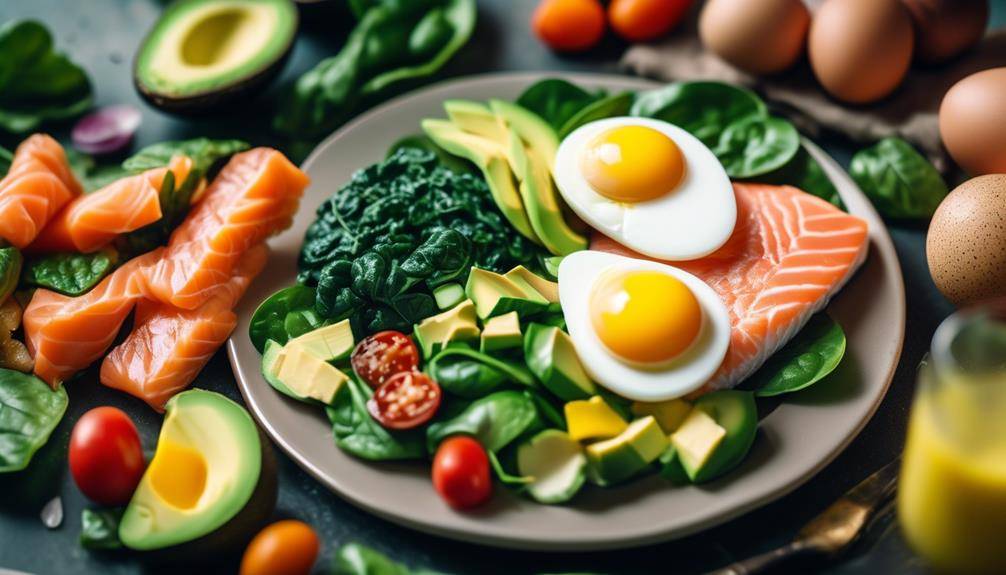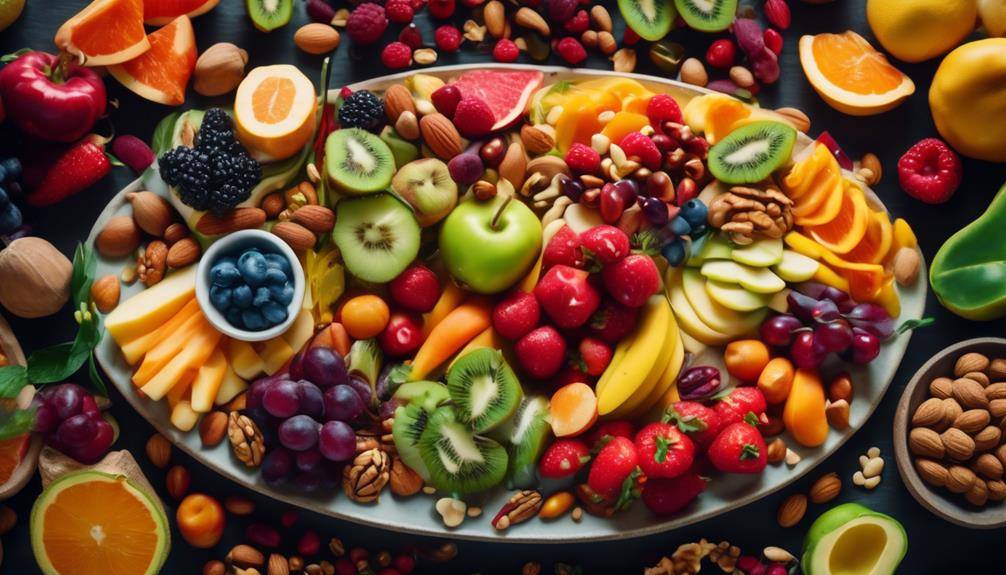How To: Understanding Principles of Ketogenic Diet

How To: Understanding Principles of Ketogenic Diet; Imagine embarking on a journey to unravel the secrets of the ketogenic diet, a path paved with scientific principles and transformative possibilities. As you take your first step, you’ll begin to understand how this diet works at its core, opening doors to a myriad of potential benefits. But what exactly is the ketogenic diet, and how does it bring about these remarkable changes? Well, stay with me, because in the following paragraphs, we will explore the principles of this diet, the foods to include and avoid, and even provide tips for starting your own ketogenic journey. So, buckle up and prepare to embark on a voyage of knowledge and discovery.
What Is the Ketogenic Diet?
The ketogenic diet is a low-carbohydrate, high-fat eating plan that has been shown to promote weight loss and improve various health markers. When it comes to the basics of the keto diet, the main goal is to shift your body into a state of ketosis. This is achieved by drastically reducing your carbohydrate intake and increasing your consumption of healthy fats. By doing so, your body is forced to burn fat for fuel instead of carbohydrates.
Compared to other diets, the ketogenic diet stands out due to its unique macronutrient composition. While most diets focus on reducing overall calorie intake, the keto diet emphasizes the specific balance of carbohydrates, fats, and proteins. By significantly reducing carbohydrates, your body enters a metabolic state called ketosis. In this state, your body produces ketones, which are molecules that are used as an alternative fuel source.
One of the key benefits of the keto diet is its potential for weight loss. By restricting carbohydrates, your body is forced to tap into its fat stores for energy, leading to a decrease in body weight. Additionally, the high-fat content of the diet helps to keep you feeling full and satisfied, reducing the likelihood of overeating.
Furthermore, the ketogenic diet has been shown to have positive effects on various health markers. Research suggests that it can improve insulin sensitivity, lower blood sugar levels, and reduce inflammation. It may also benefit individuals with certain medical conditions such as epilepsy, polycystic ovary syndrome (PCOS), and metabolic syndrome.
How Does the Ketogenic Diet Work?
To understand how the ketogenic diet works, it’s important to grasp the fundamental principles behind its metabolic process. The ketogenic diet is a low-carbohydrate, high-fat diet that forces your body to enter a state of ketosis. In this state, your body switches its primary fuel source from glucose to ketones, which are produced from the breakdown of fats in the liver.
Here’s how the ketogenic diet works:
- Restricts carbohydrate intake: By severely limiting your carbohydrate intake to about 20-50 grams per day, the ketogenic diet puts your body in a state of glucose deprivation. This forces your body to search for an alternative fuel source.
- Increases fat consumption: As you reduce your carbohydrate intake, you need to replace those calories with fats. Consuming high amounts of dietary fat prompts your body to start breaking down fats into ketones, which can be used as fuel by your cells.
- *Emotional appeal: Imagine being able to indulge in delicious, fatty foods while still reaping the benefits of weight loss.*
- *Emotional appeal: Picture yourself feeling satisfied and full after a meal, without the need for constant snacking or cravings.*
Benefits of the Ketogenic Diet
One of the key advantages of the ketogenic diet is its ability to promote weight loss and improve overall metabolic health. When you follow a ketogenic diet, your body enters a state of ketosis, where it primarily relies on fat for fuel instead of carbohydrates. This shift in fuel source can lead to significant weight loss, as your body starts burning stored fat for energy. Research has shown that the ketogenic diet is effective for weight loss, with several studies demonstrating greater weight loss compared to other diets.
In addition to weight loss, the ketogenic diet has also been found to have positive effects on cognitive function. The brain is a highly energy-demanding organ, and it typically relies on glucose for fuel. However, during ketosis, the brain can efficiently use ketones as an alternative fuel source. This has been linked to improved cognitive function, including enhanced focus, mental clarity, and memory.
Furthermore, the ketogenic diet has been shown to have various metabolic benefits. It can improve insulin sensitivity, leading to better blood sugar control and reduced risk of type 2 diabetes. It may also have positive effects on cholesterol levels, with studies showing increases in HDL (good) cholesterol and decreases in LDL (bad) cholesterol and triglycerides.
Foods to Eat on a Ketogenic Diet
To successfully follow a ketogenic diet, it is important to focus on consuming specific foods that are low in carbohydrates and high in healthy fats. By adhering to a proper ketogenic diet meal plan, you can ensure that your body enters a state of ketosis, where it primarily burns fat for energy instead of carbohydrates. Here are some foods that you can include in your ketogenic diet:
- Healthy Fats:
- Avocados: Packed with monounsaturated fats, avocados are not only delicious but also a great source of healthy fats.
- Olive Oil: This oil is rich in healthy fats and can be used for cooking or as a dressing for salads.
- Protein Sources:
- Eggs: Eggs are a versatile and nutritious protein source that can be enjoyed in various ways, such as boiled, scrambled, or in omelets.
- Fatty Fish: Salmon, mackerel, and sardines are excellent sources of omega-3 fatty acids and protein.
- Low-carb Vegetables:
- Leafy Greens: Spinach, kale, and lettuce are low in carbohydrates and high in essential nutrients.
- Cruciferous Vegetables: Broccoli, cauliflower, and Brussels sprouts are not only low in carbs but also rich in fiber.
In addition to these foods, it is important to have the best keto-friendly snacks on hand to avoid straying from your diet. Some options include nuts, such as almonds and walnuts, which provide healthy fats and a satisfying crunch. Cheese, both hard and soft varieties, is another great snack option that is low in carbs and high in flavor. Lastly, dark chocolate with a high percentage of cocoa can be enjoyed in moderation as a delicious treat.
Foods to Avoid on a Ketogenic Diet
When following a ketogenic diet, there are certain foods that you should avoid in order to maintain ketosis and achieve your desired results. These forbidden keto foods include high-carbohydrate items such as grains, starchy vegetables, and sugary treats. Additionally, ingredients like refined oils and artificial sweeteners should also be eliminated from your diet to ensure you stay on track with your ketogenic goals.
Forbidden Keto Foods
Avoiding certain foods is crucial when following a ketogenic diet, as they can hinder your progress and prevent you from achieving ketosis. To help you stay on track, here are some forbidden keto foods to avoid:
- High Carb Foods:
- Grains such as wheat, rice, and corn
- Starchy vegetables like potatoes and carrots
- Sugary fruits such as bananas and grapes
- Keto Friendly Substitutes:
- Cauliflower rice instead of regular rice
- Zucchini noodles instead of pasta
- Berries like strawberries and blueberries instead of high sugar fruits
No-Go Ketogenic Ingredients
Eliminating certain ingredients is essential for maintaining a ketogenic diet and achieving your desired results. When following a keto diet, it is important to be aware of hidden sources of carbohydrates that can easily derail your progress. One common misconception is that all sweeteners are keto-friendly. However, many artificial sweeteners such as maltitol, sorbitol, and xylitol can actually raise blood sugar levels and kick you out of ketosis. It is best to opt for natural, low-carb sweeteners like stevia, erythritol, or monk fruit.
Additionally, certain foods may contain hidden carbohydrates that can sabotage your carb intake. These include processed meats, condiments, and sauces that often contain added sugars or high-carb ingredients. Therefore, it is crucial to read labels carefully and choose foods that are free from hidden sources of carbohydrates.
Tips for Starting a Ketogenic Diet
To successfully begin a ketogenic diet, consider these practical tips:
- Meal Planning
- Plan your meals in advance: Having a well-thought-out meal plan is crucial for staying on track with a ketogenic diet. Take some time each week to plan your meals and snacks, ensuring they are low in carbohydrates and high in healthy fats. This will help you avoid impulsive food choices and keep you motivated to stick to the diet.
- Prep your meals ahead of time: Preparing your meals in advance can save you time and effort during busy weekdays. Cook and portion out your meals for the week, so you always have a keto-friendly option readily available. This will prevent you from resorting to unhealthy alternatives when you’re short on time.
- Staying Motivated
- Set realistic goals: It’s important to set achievable goals when starting a ketogenic diet. Start with small, attainable milestones and celebrate your successes along the way. This will keep you motivated and help you stay committed to the diet in the long run.
- Find support and accountability: Surround yourself with like-minded individuals who are also following a ketogenic diet. Join online communities or local support groups to share your experiences, challenges, and successes. Having a support system can provide encouragement, tips, and helpful advice when you need it.
Potential Side Effects of the Ketogenic Diet
Before starting a ketogenic diet, it’s important to be aware of the potential side effects. There are health risks associated with this diet, such as an increased risk of heart disease and kidney stones. Nutrient deficiencies are also possible due to the restricted food choices. Additionally, some people may experience temporary digestive issues like constipation or diarrhea as their bodies adjust to the high fat intake.
Health Risks Associated
While following the ketogenic diet, it is important to be aware of the potential side effects and health risks that may arise. These include:
- Nutrient deficiencies: Since the diet restricts many food groups, it can be challenging to obtain all the essential nutrients, such as vitamins, minerals, and fiber. This can lead to deficiencies and other health problems in the long term.
- Keto flu: Many individuals experience flu-like symptoms, such as fatigue, nausea, and dizziness, during the initial phase of the ketogenic diet. These symptoms usually subside after a few days but can be unpleasant.
It’s crucial to understand that the long-term effects of the ketogenic diet are not well-studied. While it may show short-term benefits for weight loss and certain medical conditions, the potential risks and consequences on overall health remain uncertain. Consulting with a healthcare professional before starting this diet is strongly recommended to evaluate individual health risks and determine if it is suitable for you.
Nutrient Deficiencies Possible
Be aware of potential nutrient deficiencies that may arise while following the ketogenic diet. While the ketogenic diet can be effective for weight loss and managing certain medical conditions, it can also lead to inadequate intake of essential nutrients. One common nutrient deficiency on a ketogenic diet is fiber, as most high-fiber foods such as fruits, whole grains, and legumes are restricted. To prevent this, it is important to incorporate low-carb, fiber-rich foods like non-starchy vegetables, nuts, and seeds into your meals.
Another common nutrient deficiency is vitamins and minerals, particularly vitamin D, calcium, and magnesium. Since these nutrients are found in foods that are limited on a ketogenic diet, it is advisable to discuss with a healthcare professional and consider supplementation to prevent deficiencies. Monitoring nutrient intake and seeking medical guidance can help ensure you’re getting all the necessary nutrients while following a ketogenic diet.
Temporary Digestive Issues
Temporary digestive issues can occur as potential side effects of the ketogenic diet. While transitioning to a low-carb, high-fat diet, your digestive system may need time to adjust, leading to digestive discomfort. Here are some ways to manage digestive issues:
- Stay hydrated: Drinking plenty of water helps prevent constipation, a common digestive issue during the initial stages of the ketogenic diet.
- Increase fiber intake: Incorporating non-starchy vegetables, nuts, and seeds into your meals can help promote healthy digestion and alleviate constipation.
- Consume fermented foods: Foods like sauerkraut, kimchi, and kefir are rich in probiotics, which can improve gut health and reduce digestive discomfort.
- Take digestive enzymes: Supplementing with digestive enzymes can aid in the breakdown and absorption of fats, proteins, and carbohydrates, easing digestive issues.
Frequently Asked Questions About the Ketogenic Diet
Are you curious about the ketogenic diet and have questions that need answers? You’ve come to the right place! Here, we will address some frequently asked questions about the ketogenic diet.
One common question is, “What should I eat on a ketogenic diet?” When following a keto meal plan, it is important to focus on consuming foods that are high in healthy fats, moderate in protein, and low in carbohydrates. Some examples of keto-friendly foods include avocados, fatty fish, nuts and seeds, olive oil, and low-carb vegetables like broccoli and spinach.
Another question often asked is, “Can I have snacks on a ketogenic diet?” The answer is yes! While traditional snacks like chips and cookies are off-limits due to their high carb content, there are plenty of keto-friendly snacks available. Some options include cheese and meat roll-ups, hard-boiled eggs, nuts and seeds, and keto-friendly protein bars or shakes.
Many individuals also wonder, “Will I lose muscle on a ketogenic diet?” When following a well-balanced ketogenic diet, muscle loss is not a concern. In fact, the diet can help preserve muscle mass while promoting fat loss. Adequate protein intake and regular strength training exercises are crucial for maintaining muscle on a ketogenic diet.
Lastly, people often ask, “How long does it take to get into ketosis?” The time it takes to enter ketosis can vary from person to person. Generally, it takes about 2-7 days of following a strict low-carb, high-fat diet to enter ketosis. However, it may take longer for some individuals depending on factors such as metabolism and activity level.
Understanding Principles of Ketogenic Diet; Frequently Asked Questions
Can the Ketogenic Diet Help With Weight Loss?
The ketogenic diet can help you lose weight by promoting fat burning and suppressing appetite. By reducing carbohydrate intake and increasing fat consumption, it shifts your metabolism into a state of ketosis, where your body uses fat for fuel.
Is It Safe to Follow a Ketogenic Diet for a Long Period of Time?
Following a ketogenic diet for a long period of time may have potential risks and long-term effects. It is important to consult with a healthcare professional to ensure it is safe for you.
Are There Any Specific Supplements That Should Be Taken While on a Ketogenic Diet?
To support your ketogenic diet, it’s recommended to take supplements like electrolytes, omega-3 fatty acids, and vitamin D. However, be aware of potential side effects such as digestive issues and nutrient imbalances.
Can the Ketogenic Diet Be Followed by Vegetarians or Vegans?
Yes, the ketogenic diet can be followed by vegetarians and vegans. There are vegetarian alternatives such as eggs, dairy, and plant-based fats, while vegans can adapt by including tofu, tempeh, and plant-based oils.
Can the Ketogenic Diet Be Beneficial for Individuals With Diabetes?
Does the ketogenic diet work for everyone with diabetes? It has potential benefits, but there are risks too. Understanding the principles of the ketogenic diet is essential before deciding if it’s right for you.
Conclusion
In conclusion, the ketogenic diet is a low-carb, high-fat diet that can help with weight loss, improved mental clarity, and increased energy levels. By limiting carbohydrates and increasing fat intake, the body enters a state of ketosis, where it burns fat for fuel instead of glucose. While there are potential side effects and it may not be suitable for everyone, the ketogenic diet has shown promising results for those looking to improve their overall health and well-being.








